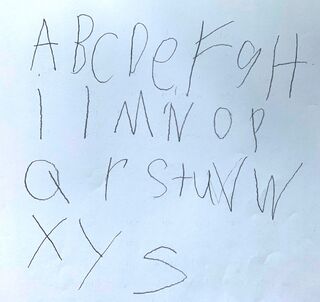Memory
5 Practical Assessment Tips for Tutoring Struggling Readers
Try these quick and easy-to-do foundational literacy assessments on your child.
Posted August 3, 2021 Reviewed by Ekua Hagan
Key points
- All parents and teachers can use five quick assessments to survey foundational reading skills that their child/student may be missing.
- Too often, schools aren’t teaching children foundational skills that are critical to literacy.
- For many children today, spelling, putting words in ABC order, and handwriting are a challenge.
Don Potter is an award-winning, incredibly successful literacy tutor who sees firsthand too many kids who haven’t learned to read, write, and spell. He has created a way to discover much of what’s missing in just one hour of informal assessments. This 74-year-old retired teacher worked successfully for 35 years in both public and private school settings before he answered his passion and calling for helping others; he started a tutoring business to save children who struggle with the essential foundational literacy skills.
Don’s work is grounded in the latest 2021st science of reading—he’s a lifelong learner—and he brings to bear encyclopedic knowledge of the history of teaching reading methods in America. He has lived through the continuous pendulum swings in reading education sometimes referred to as “the reading wars.” He knows the casualties are children. He knows from experience what works and what needs to be changed. Beyond that, Don loves and inspires kids with humor and compassion. I interviewed Don to see if he might share insights and inspiration.
Dr. Gentry: I’ve seen your work with scores of children. As a tutor, you fix reading problems in children who have struggled for years at what seems to be warp speed. What are your tips to tutors, parents, and teachers for figuring out what’s going on with their struggling reader?
Mr. Potter: I have five quick and easy assessments that I can complete in just about one hour. I follow up with more formal assessments but my quick-start assessments are fun to do and powerfully revealing. Any parent or teacher can do these.
Mr. Potter’s Tips
Tip #1 is an informal version of the more formal “rapid naming assessments” used by neuroscientists for research and by school and cognitive psychologists. Rapid naming along with phonological awareness are often touchstones for finding solutions for kids with severe reading disability. I created an informal format that even parents and teachers can use. I start with a list of the letters of the alphabet—the uppercase next to the lowercase.
I just point at random to the letters on my test sheet and ask the students to name them. I mark the ones they get wrong and record any notable comments they make such as “I have trouble writing that one.”
Importantly, I time how long it takes the tutee to say all the letters, calculate the words per minute, and record it on the test sheet. Fluency counts high on my tests because the automaticity of various components of reading is crucial to release the brain’s working memory for comprehension.
Tip #2 is as follows: I hand them a piece of paper and ask them to write the letters in ABC order. Much too often what happens is unexpected and tragic. I happen to live in a large school district that does not teach handwriting. Virtually all the kids who come to me have shockingly bad handwriting skills simply because they have not been taught. If a student doesn’t have fluency with writing letters and has to consciously think about how to make the letter it soaks up memory that is needed for reading, spelling fluency, and comprehension.


I watch the letter formation with my trained eye, noting their grip, where they start on the line, exactly how they form the letters, which letters they miss, and I time this test also. In my experience after years of tutoring, I’ve observed a close relationship between accuracy and speed of letter formation to both reading and spelling proficiency. Any parent or teacher would want to know if their child hasn’t been taught these skills.
There are alternative handwriting models but I use Zaner-Bloser Manuscript. One of the strengths of the program is teaching the kids where to touch on the paper to start the strokes. Having not been taught letter formation, many of the kids who come to me start letters on the lower baseline but letters should always start at the top. When kids don’t know how to hold a pencil, letter formation is awkward and often barely readable.
Tip #3 is something that has been driven home to me by you, Dr. Gentry. As you say, “If you can spell it, you can read it!” Literacy instruction in schools must return to paying attention to spelling. It’s been said that spelling is the red-headed stepchild to teaching the foundations of reading. Too many schools and districts don’t have 20 minutes of explicit spelling instruction in a grade-by-grade curriculum.
On the first day we meet, I give my tutees an easily administered spelling test that is available and free here. The Gentry Spelling Grade-Level Placement Test gives me the student’s grade level for spelling instruction and any parent or teacher can administer it. Often, there is a good match of the child's spelling grade level to his or her reading grade level.
Tip #4 is another common-sense practice that one would think was happening in all schools. You would be surprised to learn that many students have not been taught to use a dictionary. I have my students try to look up a few words in a standard elementary dictionary. For the struggling kids who come out of my local public school district that is always a fiasco. I hand the tutee a set of words to put in ABC order. Too often that draws a blank! Alphabetical order is a life skill that we use every day. In successful academic programs, kids learn alphabetical order in kindergarten. If a fifth-grader can’t use a dictionary, it’s a huge red flag.
Tip #5 is to put up a sign that says, “No guessing allowed!" Kids who are in some of the balanced literacy or whole language reading programs have been taught to guess at the word rather than read the letters. I tell them to look at every letter or syllable chunk when they decode a word because this is how the alphabet system works.
Dr. Gentry: Don’s tips and how he saves kids who are struggling are like 21st-century neuroscience and cognitive psychology giving a fist bump to common sense. Automaticity with five components of reading, namely the alphabet, handwriting, phonics, word reading, and spelling, plus building word knowledge including dictionary use, are essential for literacy success. Try these quick assessments; see what you find out!




